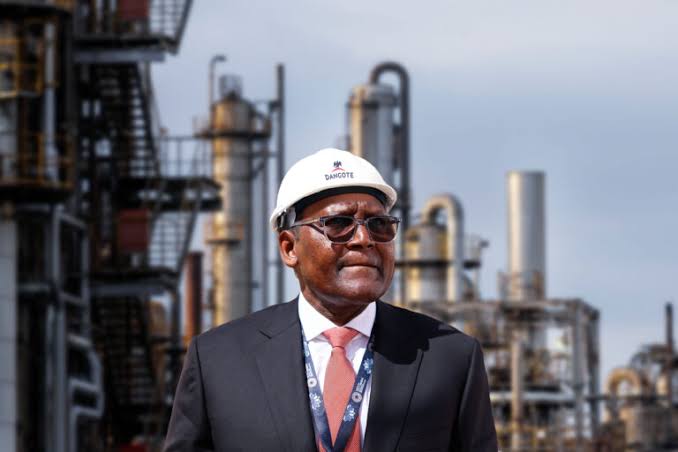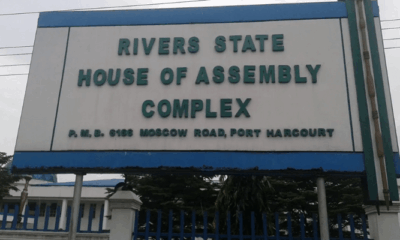Africa
Telling Faultfinders That Dangote Refinery Is A Blessing, Not a Curse -By Isaac Asabor
This refinery was not built for Aliko Dangote alone. It was built for all Nigerians, the market trader, the farmer, the transporter, the job seeker, and the nation itself. Its success is our success; its failure would be our collective tragedy.

Nations do not develop by accident. They progress when visionaries dare to dream big and push against entrenched systems of inefficiency. In Nigeria today, one such bold dream has been realized in the form of the Dangote Refinery. Yet, rather than uniting behind this achievement, some Nigerians have turned it into a target of relentless attacks. The refinery, a landmark project that should be celebrated as a beacon of industrial self-reliance, has instead been treated as if it were a curse. Enough is enough. Critics must back off and let it deliver the benefits it was built to provide.
When Aliko Dangote first announced plans to build the world’s largest single-train refinery, many dismissed it outright. Skeptics branded it an impossible fantasy, claiming it would never be completed. Conspiracy theorists suggested it was designed to corner the downstream market. Others dismissed it as a billionaire’s vanity project.
What they ignored was the context: Nigeria, Africa’s largest crude oil producer, had for decades been unable to refine enough petrol for its own people. Billions of dollars were wasted on fuel imports while our state-owned refineries remained comatose. Dangote’s intervention was not a luxury but a necessity.
Despite regulatory hurdles, financing battles, and logistical nightmares, including transporting massive refinery modules from overseas, the project was completed. In 2023-2024, it stood as a monumental achievement, proving that Nigerians could build and operate world-class infrastructure.
But instead of celebrating, critics simply shifted the battleground. Suddenly, the questions became: Why are product prices not crashing overnight? Why is distribution taking this form? Why does the refinery not wave a magic wand to fix decades of rot in the downstream sector?
Such criticisms are not only unfair, they are dishonest. No refinery operates in isolation from global realities. Prices are shaped by crude-oil supply, foreign-exchange dynamics, and international market trends. Expecting Dangote Refinery to undo decades of mismanagement instantly is unrealistic.
Still, its long-term benefits are undeniable: reduced dependence on imports, savings in scarce foreign exchange, job creation, and stimulation of industrial growth. Yet detractors persist in portraying it as a burden instead of a blessing. Without any iota of exaggeration, evidences are already on public domain showing what the refinery is already doing, and what it could still do, if left alone to operate properly: For instance, as gathered from Nairametrics, Nigeria used to spend about US\$660 million per month on petrol importation, nearly US\$7.92 billion annually.
With the implementation of the policy to sell crude to Dangote and other local refineries in naira, Nigeria stands to save about US\$7.32 billion annually, a 94% reduction in dollars spent on fuel imports.
In the first quarter of 2025, the petrol import bill dropped sharply, from N3.81 trillion in Q1 2024 to N1.76 trillion in Q1 2025, a 54% year-on-year decline. In fact, analysts attribute much of this decline to increased output from Dangote Refinery, which is now supplying a significant portion of Nigeria’s petrol demand.
Before Dangote, Nigeria was importing nearly 90% of its refined petroleum products. This exposure to foreign supply chains, foreign exchange volatility, shipping costs, and time delays has long crippled fuel availability and stability. The refining capacity of Dangote (650,000 barrels per day) changes this equation fundamentally. These numbers are not abstract. They translate into real things: Stronger foreign exchange reserves, since less naira is converted to dollars monthly for fuel imports, more stable fuel supply, fewer fuel scarcity crises, potential for reduced pump prices or at least fewer fluctuations, because local refining reduces many of the added costs on imported fuel and creation of jobs; both direct and indirect, in refinery operations, logistics, distribution, maintenance, and in industries that depend on stable fuel. While I have not seen a definitive, publicly verified figure for jobs created so far tied only to Dangote’s downstream activities, multiple sources cite “thousands” of jobs created and many more in ancillary services. (It is reasonable to expect tens of thousands of jobs across the value chain when the refinery is fully operational.)
As if the construction-phase skepticism and distribution-phase criticisms were not enough, labour unions have now joined the chorus of attacks. Framing the refinery as an adversary rather than a partner in national progress, they’ve found fault with the refinery’s operations, meaning of pricing, or supply of feedstock, often without fully acknowledging the complexity of international crude markets, exchange rates, or supply chain constraints.
Constructive criticism is essential in a democracy. But this constant barrage of hostility is beginning to look like sabotage, especially when there is clear evidence of substantial, measurable gain for the country from the refinery’s operations.
The real beneficiaries of these attacks are not ordinary Nigerians. They are the entrenched cartels that profited from the importation regime, the middlemen who thrived on scarcity, and the international traders who treated Nigeria as a perpetual dumping ground. These groups fear losing relevance in the face of a functional refinery.
They also fear transparency: with local refining and more direct distribution, there’s less room for inflated margins, opaque supply chains, and profiteering off fuel scarcity.
History shows that resistance to progress is not new in Nigeria: When telecommunications was liberalised and mobile telephony was introduced, many predicted it would be too expensive for average Nigerians. Today, it is everywhere and has become a huge contributor to GDP.
When increased local cement production (including by Dangote Cement) was scaled, there were fears Nigeria could never be self-sufficient in cement. Yet today Nigeria is a net exporter of cement.
Each time our people doubted what was possible, innovators proved them wrong.
Other nations celebrate their industrial champions. South Korea backs Samsung and Hyundai. China nurtured Huawei and Sinopec. These companies became global giants that lifted their countries’ economies. In Nigeria, however, we often attack them instead.
If Dangote Refinery had been built in Ghana or Kenya, citizens of those countries would celebrate it as a national treasure. Here, it is vilified and attacked from all corners. This destructive mindset must change if we truly want to progress.
The way forward is simple: let Dangote Refinery breathe. Give it the space to stabilize operations. Allow it to align with global realities without the distraction of baseless antagonism. Criticize constructively, yes, but stop the sabotage disguised as advocacy.
Most importantly, Nigerians must recognize the difference between genuine concern and vested-interest sabotage. Not everyone attacking Dangote Refinery is fighting for the people. Some are simply fighting for their pockets.
Dangote Refinery is a blessing, not a curse. It represents hope for energy self-sufficiency, economic stability, and industrial renewal. To continue tearing it down with endless attacks is to sabotage our future.
This refinery was not built for Aliko Dangote alone. It was built for all Nigerians, the market trader, the farmer, the transporter, the job seeker, and the nation itself. Its success is our success; its failure would be our collective tragedy.
The message to the critics is clear: “back off”. Let us, for once, support progress rather than strangling it. Let us protect this national asset, not destroy it. Because if we cannot support our own, then we have no one to blame when others surpass us.
























